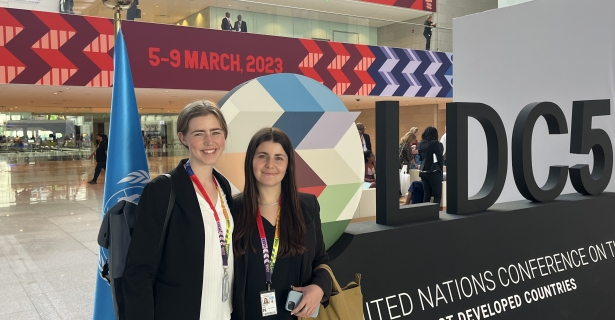After an eighteen-hour journey from chilly Boston, our plane successfully defrosted as we emerged into the hot desert of Qatar. Over the next four days, we will represent Tufts University at the 5th United Nations Conference on Least Developed Countries (LDC5) in Doha, Qatar. Divided by sectors, Tufts’ delegation is a part of the many civil society organizations across the world coming together to discuss the critical issues facing least developed countries (LDCs) and durable solutions to tackle them. As we arrived at our hotel, we quickly refreshed before heading to convene with the rest of our delegation at the beginning of the conference.
Our observer status grants us the ability to attend the many panels, roundtables, and forums held at LDC5 this week. World leaders including heads of state, non-governmental leaders, private sector executives, parliamentarians, and young people compromise the important speakers from who we will hear about the unique and important roles they play in achieving the goals of the Doha Programme of Action. The variety of perspectives provides us with a wide scope of dilemmas and proposed solutions to think about and discuss together.
To begin, we settled into the opening plenary on civil society. The panelists discussed the importance of widening our viewpoint from solely looking at the forty-six countries that hold LDC “status” to understanding the interplay of the impact the Global North has on the Global South as a whole. One panelist highlighted Africa's important role in the discussion of LDCs due to thirty-three designated LDCs being on the continent. She discussed that African LDCs are trapped by three paradoxes: financial, energy, and food systems. Another panelist spoke about the importance of intra-African trade as a reliable and sustainable solution for development. Finally, the last panelist wrapped up the plenary by stating that these issues are “not a matter of justice, but a matter of survival.” Overall, this session was an essential start to the discussion on issues LDCs face and how civil society can address them sustainably and together.
We then headed to lunch where we experienced first-hand the benefits of in-person convenings—meeting new people! We enjoyed a conversation with a journalist from one of the LDCs and had the opportunity to ask her about her work and experiences in journalism. The conversation reminded me of the symposium the IGL held last semester on the importance of the freedom of the press.
Over the last sessions of the day, we observed the organization of the United Nations in the first high-level thematic round table on “investing in people in LDCs to leave no one behind,” and then saw a dance performance ahead of a discussion on the role of the private sector in supporting LDCs. We concluded our day with a forum on civil society and equity in multilateralism. There, a panelist empowered the audience to stand up for their rights in the multilateral space. Now, back at our hotel, I reflect on the packed day behind and look forward to the next few days of learning ahead.

